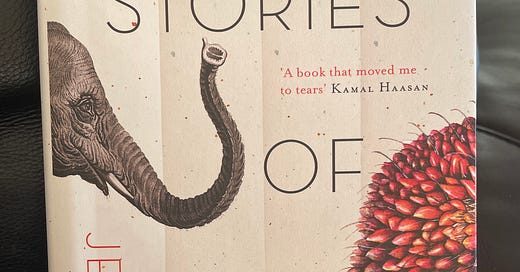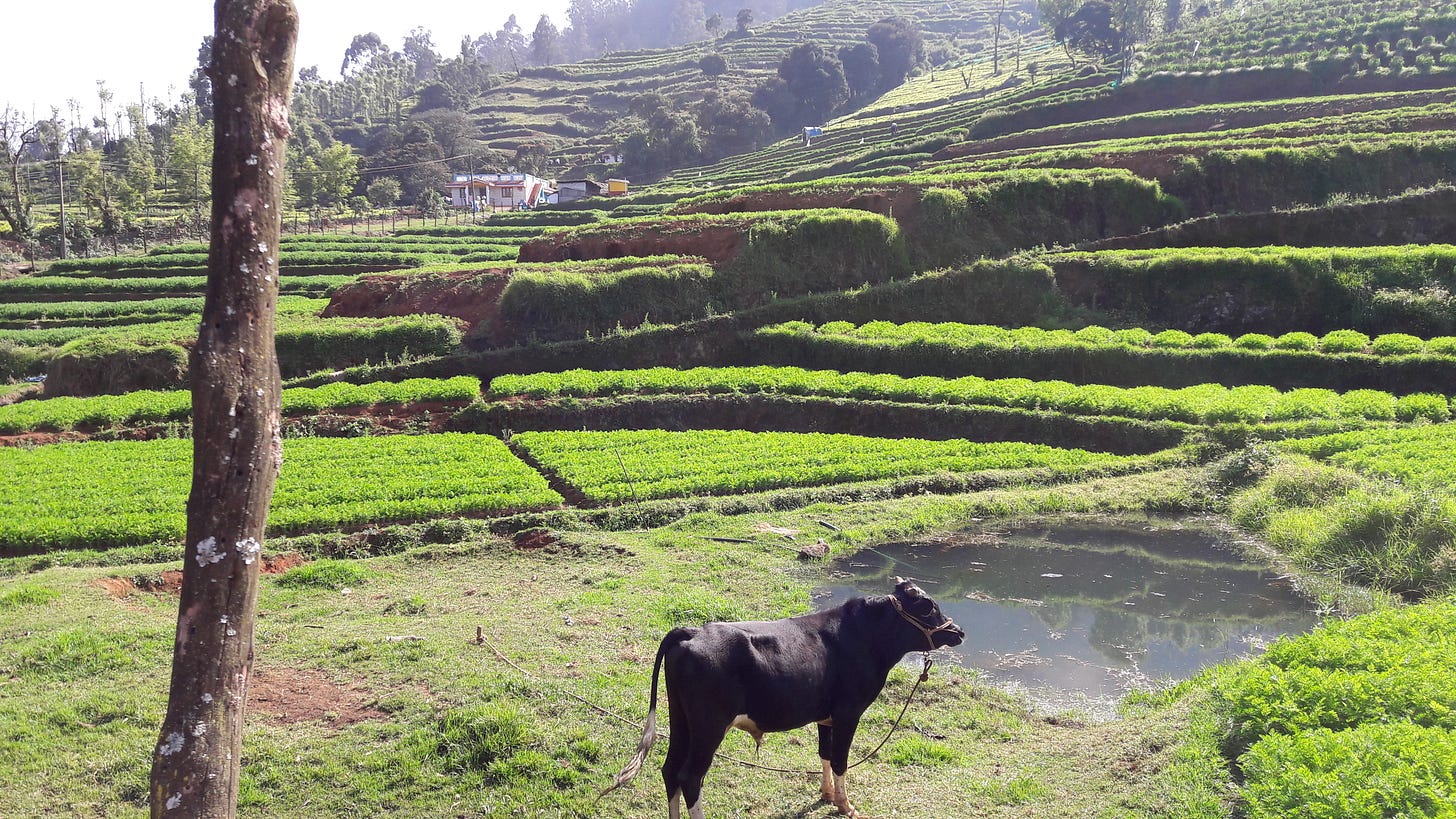TRUE TALES FROM TAMIL COUNTRY
Every character in this collection of stories from deep in Tamil Nadu shows us how far some will venture to stand by their ideals. The tales are at once heartbreaking and heartwarming. They're true.
In the summer of 2021 I was interviewing a Singaporean expatriate who conducted Tamil workshops at local schools for a story on Tamil in Singapore. She raved about a Tamil writer named B. Jeyamohan. At the time, I had already been listening to talks on Russian literature by S. Ramakrishnan (“SRa”) from India’s Chennai. In due course of time, I began to listen to Jeyamohan’s lectures as well. I was hooked.
While my knowledge of specific works of Russian literature improved, my vocabulary in literary Tamil surged, too. What astonished me was the strange twist of circumstances by which I’d suddenly happened upon two literary figures who wrote exclusively in Tamil but also read widely in English and had a body of their own thoughts on English literature.
One thing does often lead to another. There I was in Singapore—where four official languages collided and connected four groups of people who called Singapore home—and I was soaking up talks from Chennai in Tamil by a writer in India.
Together, S. Ramakrishnan and B. Jeyamohan have expanded my understanding of the world, fortifying my belief that the world of English is much too narrow in scope, and that the more we hear from writers in other cultures and languages, the greater our scholarship.
This week’s pick of Tamil tales not only reinforced those feelings about learning and growing at every stage of my life. It combined several of my interests in soul-satisfying ways. Jeyamohan’s Stories Of The True—translated by Priyamvada Ramkumar and published in 2022 by Juggernaut—brought me into a world I identified with in terms of geography. It dropped me into the world of Tamil culture, with unexpected dives into expressions from my mother tongue that I responded to instinctively. I could not, however, have read Jeyamohan’s writings in Tamil and understood it to my satisfaction. Although I can read and write in Tamil, my grasp of literary Tamil is inadequate.
Tamil is a diglossic language and while I can speak a lowbrow, contemporary Tamil, I would not trust my comprehension of the “other” Tamil used in literature and in formal education. The Tamil I use daily is colored by my connections to the state of Kerala; it is also shaped by a Brahmin milieu and the Chennai street lingo that I’ve been a part of. Both have sullied (and buoyed) my Tamil in equal measure. Despite the many holes in my Tamil education, as I read Jeyamohan’s stories, I did actually feel I was reading them in Tamil.
While the credit for this experience certainly owes so much to the smoothness of the translation by Priyamvada Ramkumar, I did feel that there was scope for more tautness in the prose without sacrificing the authenticity of its rendition. The writing that often seems perfectly acceptable in a regional language can feel a little bloated and gratuitous in English. It seems unfair even to make this observation, however, given that Stories Of The True is Ramkumar’s debut translation.
Every tale in Jeyamohan’s collection is based on the lives of real people. While each narrative is grounded in values that are central to Hindu philosophy, the overarching theme of the book is about always doing the right thing. Aram—The Song Of Righteousness is the title of the first story.
As the translator observes astutely, the Tamil word “aram” is extremely hard to translate perfectly: “A complex and, I’d dare say, untranslatable word.” Ramkumar notes that “while ethics is probably closest in meaning to the word, “aram” is a much more capacious word”. I wonder if it’s really closer in meaning to a confluence of righteousness, selflessness, generosity and moral rectitude. In such a complicated world as the one we live in, isn’t it too much to expect an adherence to “aram”? The author’s foreword on the subject (see below for an excerpt) is infinitely thoughtful and moving.
“These stories do not separate the idealism form the lived life. Instead, they present the dialogue that idealism engages in with the darkness and rot that surrounds it. Idealism can radiate light on its own strength. It can stand on its own feet, without leaning on another.” ~~~ Jeyamohan, Author’s Note

The opening story, Aram, is a tale about propriety and responsibility. An impoverished writer is cheated by a local businessman after he works day and night to produce a collection of student texts simply to make ends meet. In this extraordinary tale about hardship, the right thing is done in the end but not before the reader is awash in despair and tears. I understood all too well the extreme frustration of a man who knows that all he wants to do is to write but he goes unappreciated by the community around him. Aram is the first tale for a reason because it sets the stage for the entire collection.
The second story asks this question: What if one’s greatest ideal was to let go simply in order to safeguard the peace? What if, for the sake of upholding the peace and balance of family life, one must be ready to both endure hardship and sacrifice one’s identify? By the time it ends, The Penance of the Goddess equates sacrifice also to steely resolve. It’s not spinelessness. As if to demonstrate this, when the grandmother in the story leaves the world, her bent, unbroken spine literally, bears testimony to her resolve. Like Shiva’s consort, Parvathi—who stands on one leg in the yogic vrksasana posture with her upper arms held raised above the head—the grandmother too seems to have been in an eternal penance, sacrificing everything, including her gift, that of a melodious voice, for her husband’s sake.
In a telling moment, the narrator refers to Lord Shiva’s cosmic pose holding an entire world aloft. “If Nataraja sets down his raised foot, an aeon ends; the universe and all matter, animate and inanimate, will perish—that’s the story. What will happen if the goddess sets down her raised foot? Nothing at all. She’s a mother, isn’t she?”
Among the most quoted in all the reviews for this book seems to be The Elephant Doctor—read this BBC story by Harry Marshall on this “elephant doctor”—which is not so much about the late “elephant doctor” himself but about his attitude to work. How much should we love our work? Why should awards and merit matter at all if we cared deeply enough about our work?
In the passage below, the words of Dr. K, the “elephant doctor”, underscore one of the diktats of The Bhagavad Gita on selflessness in one’s approach to work. The words he uses in reference to Selva, the elephant, say it all.
In order to live here, the first thing to do is to fling away everything that belongs in the outside world—wealth, fame, power, all of that—and be here like those monkeys, like this elephant. You should have no family outside of them. Go, man, go on and look outside. That Selva standing there…what kin can be dearer than him? His majesty, his compassion, his heart, devoid of any sort of depravity, expansive as the ocean…once you know that, which human will matter to you? ~~~The Elephant Doctor, Stories Of The True
In The Palm-Leaf Cross, Dr. Howard Somervell walks through village streets from morning to night in search of people dying of cholera. Until his dying day, the professor in The Churning Curd believes in his top student and longs for him to shake himself out of his drunken stupor. By the time we reach the end of A Hundred Armchairs, we know that the officer in the civil services finds it impossible to rise out of his station in life: The untouchability of his past will chase him like his shadow.
The final story in the collection is One World, a story that stemmed from the author’s meeting with Garry Davis, a self-declared “World Citizen #1” whose experience in the world war convinced him that the only way people would not fight if they all owned a world passport. Yet the man’s doggedness seemed like an extreme naiveté that would never hold up in a world that’s balkanized beyond recognition. Notwithstanding the eccentricity of Garry Davis, the story made me wonder about the nature of conviction itself. By the time Davis died in 2013, he had traveled to over 200 countries using his world passport and spent many days in jail for civil disobedience. I realized how it had become almost impossible to actually belong in the world while upholding one’s lofty ideals. Davis doesn’t give in, however. He’s fearless and the story describes at length how Davis handled solitary confinement for several years with the message of Vedanta.
Through sacrifice. That is the only way. When I go to prison for my ideas, those ideas become impossible to brush aside. If a man is willing to give up his belongings, his life, give up every last thing that is his, all for the sake of an idea, that idea acquires unimaginable power. That, in fact, is the Gandhian way. ~~~One World, Stories Of The True
The experience of reading Stories Of The True will stay with me for a long time. Each is a tale of unimaginable hardship and mental rigor in an unrelenting world where caste oppression, gender differences and poverty often run together, altering the world view of the victim. For me, the reader, it was eye-opening. What is altogether marvelous is that each story ends on a hopeful note.






Lovely writeup, and one more book to add to my list! I'm glad that there are glimmers of hope amidst all the hardship and despair. That's what keeps us going, isn't it?